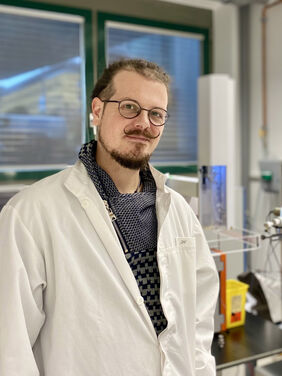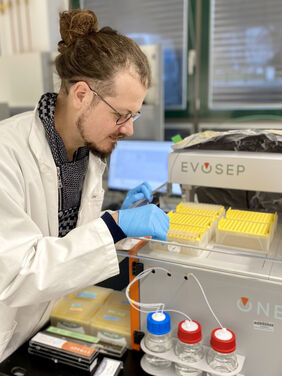What do the Tuscan city of Prato and the Thuringian city of Jena have in common? Both are home to Emilio Cirri. The 34-year-old Italian chose to study in Germany – and ultimately decided to stay with his family.
Since the beginning of the year, Emilio has been leading the Core Facility Proteomics at the Leibniz Institute on Aging – Fritz Lipmann Institute (FLI). “I have always been fond of the technical aspect of chemistry and molecular biology. After completing my studies in analytical chemistry, I was looking for an alternative to classical research and found it in the Core Facilities at the FLI,"” says the Core Facility Manager. Emilio has been in this position since the beginning of the year and has been at FLI for four years now.
Emilio and his team support researchers from sample preparation to data analysis and visualization for the identification and quantification of proteins using mass spectrometry. “The tasks are incredibly diverse,” says Emilio – always on the go, always in conversation. “Understanding, assisting, teaching, networking,” he describes his daily routine. And it never gets boring. “We are involved in so many different scientific questions. The intensive exchange is simply crucial. I learn something new every day,” says Emilio. Moreover, the FLI collaborates with numerous partners. “Research is ultimately successful only in collaboration. The FLI embodies this idea through the cooperation of scientists, experts, and resources,” says Emilio. He is convinced: “This is the best and most successful way to address complex challenges and develop solution approaches."
Background
Proteomics is a field of molecular biology that deals with the comprehensive analysis of proteins in a biological sample. Proteins are crucial building blocks of life and play essential roles in biological processes. The goal of proteomics is to identify, quantify, and understand the functions of all proteins in a cell, tissue, or organism.
There are various approaches in proteomics. One of them is mass spectrometry. It allows the identification and quantification of proteins by measuring their mass and/or charge.
The Core Facilities and Core Services of the FLI support scientists with state-of-the-art technology platforms and methodology to carry out their research in a timely and efficient way. Head of Core is Tobias Sperka. In close collaboration with Dr. Alessandro Ori and Dr. Joanna Kirkpatrick, the subfield Core Facility Proteomics was developed and established, among other things.
The Core Facility Proteomics at the FLI offers a number of different analysis to dig deeper into the proteome: from Post Translational Modification (PTM) analysis, such as phosphorylation, ubiquitination and acetylation, to Immunoprecipitation (IP) and Proximility labelling techniques to identify interactions between proteins. One recent development is aiming to go to low input sample preparation (thousands to ten of cells) down to single cells analysis.
Another important aspect is that most of quantification is done in a label free approach using data-independent acquisition (DIA). It also enables FLI teams to not only identify proteins but also compare changes in the abundance of thousands of proteins between different samples.










